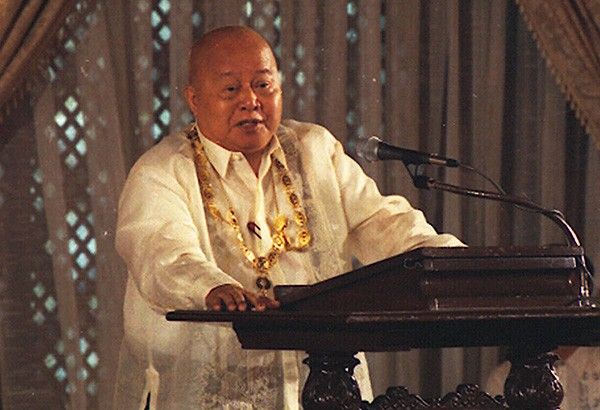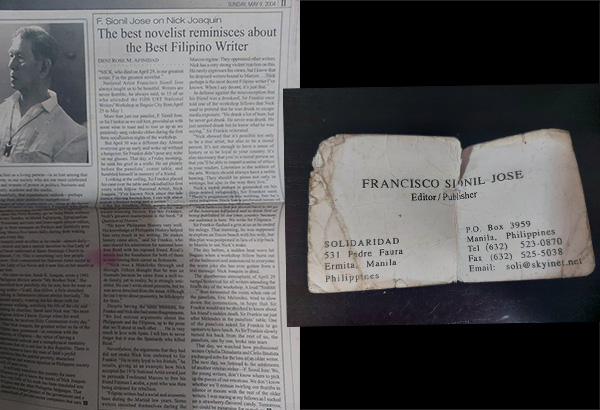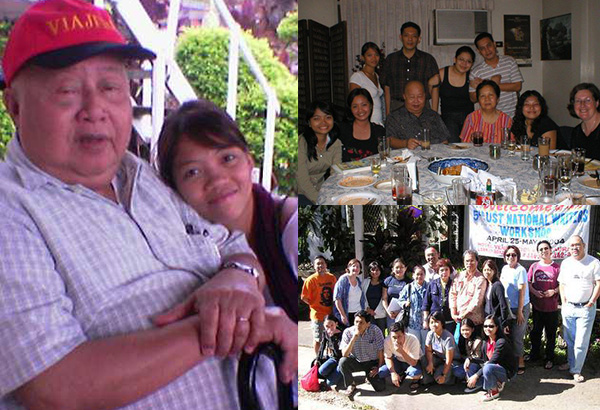'Icon, greatest Filipino novelist': CCP, writers mourn National Artist F. Sionil Jose’s passing

MANILA, Philippines — “What’s your course?”
That was how F. Sionil Jose would usually greet student writers. When I was thrown the same query, I proudly replied: “Journalism.” To which he retorted with an even prouder response: “Quit it! You can be a writer without taking up Journalism.”
For Sir Frankie, as we fondly called him, Journalism was a useless course. When I asked him one evening during our University of Santo Tomas (UST) Writers’ Workshop in Baguio City, what he thought was the best course to major in, he firmly stood his trademark wooden cane on the ground and declared: “Literature!”
“Literature is the noblest of the arts,” he said. “Writers should always have a noble bearing. They should be pious not only in writings, but also in the way they live.”
Sionil Jose and his good friend Nick Joaquin, of course, were among the best examples of non-Journalism majors who went on to become successful journalists and editors. From 1960 to 1962, Sionil Jose became the editor of Asia Magazine, a Sunday supplement distributed from Hong Kong throughout Asia.
Sir Frankie was very proud of his Ilocano roots, often telling us, “There are only two kinds of Filipinos: the Ilocanos and others.”
Ask any batch of writers before and after us and they’d tell you that they most likely had that same basic experience of Sir Frankie. But our batch at the UST Writers’ Workshop, 2004, stood out at least for one thing. The workshop week was about to end with a festive socials night when the panelists got a call: Nick Joaquin is dead.
The panelists, which included Dr. Ophelia Dimalanta, recipient of South East Asia’s highest literary honor, SEA Write Award, and another National Artist for Literature and dear mentor Dr. Cirilo F. Bautista, broke the news gently to Sir Frankie, but he broke down anyway. The formidable but endearing pillar that was F. Sionil Jose crumbled into tears. And we all wept – some even with hysteria – with him.
The previous workshop nights filled with drunken videoke arias turned morose. The life-of-the-party Sionil Jose, who never failed to pour hard liquor into our glasses every meal (now, I can confess that I sprinkled mine on plants to evade hangover, but he was quick to replenish), shuttered into pieces.
‘The greatest novelist’

“’NICK, who died on April 29, is our greatest writer. I’m the greatest novelist’,” I quoted Sionil Jose as saying in my Manila Times article published on May 9, 2004, titled, “F. Sionil Jose on Nick Joaquin: The best novelist reminisces about the Best Filipino Writer.”
“National Artist Francisco Sionil Jose always taught us to be boastful. Writers are never humble, he always said, to 15 of us who attended the Fifth UST National Writers’ Workshop in Baguio City from April 25 to May 1 (2004),” my article continued.
Apart from being both National Artists for Literature, Sionil Jose and Joaquin both adored National Hero Jose Rizal, whose works laid the foundation for Jose and Joaquin’s lifelong careers as fictionists and as among the most read Filipino authors in the English language.
“We had serious arguments about the Philippines and the Filipinos, up to the point that we’ll shout at each other,” Sionil Jose recalled, as published in my article.
“He is very much in love with Spain. I tell him to never forget that it was the Spaniards who killed Rizal.”
The next day, Sionil Jose wasted no second to haste from Baguio, to Manila where his best drinking buddy, the “Manileño through and through” Quijano de Manila, was laid to rest.
But that was not the last of what we’ve seen from Sir Frankie. He continued writing for his country and for his friend, because as he said, it is in writing non-stop that he could keep Nick’s memory alive. We went on to see him as The Varsitarian’s most prestigious and longest-living alumnus. He lived and worked hard as long as he could, writing with discipline to churn out novels as a full-time job, for the dream to give our country its first Nobel Prize for Literature.
Apparently, 97 years were not enough to reach that dream but at least it took him to a place that all of us can only dream of: a very fruitful journey and a peaceful death, with the bonus of having written a farewell letter.
And so for you, dear mentor, ka-Varsi, and one of my first genuine Facebook friends, Sir Frankie, I raise my glass and drink once more.

‘First genuine Southeast Asian’
Dr. Jose Wendell Capili, University of the Philippines Professor and Assistant Vice President for Public Affairs, cited Singaporean poet and academic Edwin Thumboo as describing Sionil Jose as probably “the first genuine Southeast Asian.”
“Of course, Frankie (Sionil-Jose), I suspect, is the first genuine Southeast Asian. See what he is trying to do with Solidarity,” Capili quoted Thumboo, regarded as one of the pioneers of English literature in Singapore, as saying.
Sionil Jose’s Solidaridad Bookshop was intended as a showcase for Philippine and Southeast Asian writers, according to “Migrations and Mediations: The Emergence of Southeast Asian Diaspora Writers in Australia” (2016), which Capili cited in his Facebook tribute.
“You can see it from the conferences he has organized over the years. You can see it from the many friendships he has formed. And that, ultimately, is the test. He is a Southeast Asian person. In 1980, F. Sionil Jose received the highly-coveted Ramon Magsaysay Award for Journalism, Literature, and Creative Communication Arts for his intellectual courage and concern for and encouragement of Asian and other writers and artists, for many of whom his Solidaridad Book Shop is a cultural mecca…
“Solidarity is a tremendous resource that scholars and others interested in our world will quarry. Furthermore, the biannual creative seminars Sionil Jose initiated for young writers of the region made a lasting impact. What is important is that Sionil Jose published writers who became either mentors or mentors of mentors of Southeast Asian diaspora writers in Australia, such as Thumboo, Ophelia Alcantara Dimalanta, Ee Tiang Hong, and Merlinda Bobis. The journal allowed readers from Southeast Asia and Australia to cultivate a sense of local, national, and regional concerns from the vantage point of the writers. These issues were: the Vietnam War, the Malaysian riots (1969), the proclamation of martial law in the Philippines (1972), the lifting of the ‘White Australia’ policy, and the emergence of multiculturalism as a centerpiece federal policy in Australia (1972), the Indonesian occupation of East Timor (1975), the rise of Singapore and Malaysia as economic powerhouses, along with many other social and political upheavals.”
‘Long live, Manong Frankie’
“One of F Sionil Jose's wishes was for young writers to grow old writing,” Manila Bulletin editor Arnel Patawaran said in a Facebook tribute.
“To him, if you had it, you had to choose it and to make yourself worthy of the craft, and ultimately to make your craft useful to your community and country.”
In a statement sent to Philstar.com, the Cultural Center of the Philippines (CCP) remembered Sionil Jose’s life and works.
“The founder of the Philippine chapter of PEN, F. Sionil Jose was one of the most revered and read Filipino writers whose works have been published and translated into various languages,” the statement said.
“Known for his novels and literary works espousing national sovereignty and social justice, his notable works include the Rosales saga, a five-novel series consisting of The Pretenders, Tree, My Brother, My Executioner, Mass and Po-on. The novels narrate the stories of the Samsons in different generations, intertwining their personal lives with the social struggles of the nation.
“Through his prolific writing since the 1960s using vernacular English, the late National Artist received various accolades including the CCP Centennial Honors for the Arts in 1998, the Outstanding Fulbrighters Award for Literature in 1988, the Ramon Magsaysay Award for Journalism, Literature, and Creative Communication Arts in 1980, as well as several Palanca Awards.
“He was bestowed the National Artist Award in 2001 for his outstanding contributions to Philippine literature.”
‘Icon with an enormous talent’
In brief Facebook eulogy, award-winning writer, activist and spoken word artist Angelo Suarez said: “If only F. Sionil Jose could meet the thousands killed by this fascist regime in the afterlife. Good night, Manong. May our memory of your class stand be clearer than our memory of your fiction.”
In a Facebook post, journalist Angelle Lopez de Leon shared a photo with Sionil Jose and Bienvenido Lumbera, his fellow National Artist and Ramon Magsaysay Award recipient for Journalism, Literature and Creative Communications.
“The Philippines lost a great man... an icon, with an enormous talent,” Angelle wrote.
“Maraming salamat sa lahat Sir! Thank you for the tips, the warm welcome you gave me every time I go to Solidaridad, and the signed books you've gifted me. Thank you also for your stories and incredible contributions to literature. I will surely miss you and your writings…”
RELATED: ‘Thank you brave heart’: F. Sionil Jose, National Artist for Literature and The STAR columnist, writes 30



















